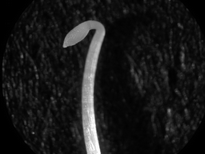Pre-germination seed–phytochrome signals control stem extension in dark-grown Arabidopsis seedlings
Abstract
The developmental pattern of dark-grown Arabidopsis thaliana is dramatically shifted by exposure of the seedlings to light: inhibition of hypocotyl (stem) growth is one of the typical responses. Here, we show that the hypocotyl growth of dark-grown seedlings is reduced by exposure of the seeds to light. The light signal is perceived by phytochromes A and B during the hours immediately prior to seed germination. The effect is obviously selective, as other processes under phytochrome control were not equally affected by the pre-germination light cue. The hypocotyl response persists for two days after termination of the light signal, which is more than the persistence observed when the seedlings themselves receive the light stimulus. Treatment with far-red light, which converts phytochrome to the inactive form, did not reduce the hypocotyl growth response to pre-germination light, indicating that the persistent signal was not active phytochrome itself. We propose that trans-developmental phase signals could help plants to adjust to their environment.

- This article is part of the themed collection: Biological photosensors

 Please wait while we load your content...
Please wait while we load your content...